

View from the EU: Britain 'taken over by gamblers, liars, clowns and their cheerleaders' Britain faces an uncertain future as it finally pulls clear of the EU’s orbit, continental commentators have predicted, its reputation for pragmatism and probity shredded by a Brexit process most see as profoundly populist and dangerously dishonest.

“For us, the UK has always been seen as like-minded: economically progressive, politically stable, respect for the rule of law – a beacon of western liberal democracy,” said Rem Korteweg, of the Clingendael Institute thinktank in the Netherlands. “I’m afraid that’s been seriously hit by the past four years. The Dutch have seen a country in a deep identity crisis; it’s been like watching a close friend go through a really, really difficult time. Brexit is an exercise in emotion, not rationality; in choosing your own facts.
And it’s not clear how it will end.” Britain’s long-polished pragmatic image had been “seriously tarnished”, agreed Nicolai von Ondarza, of the German Institute for International and Security Affairs. Fear, mistrust – and hope: Britain's long walk away from the EU. As a previous Tory prime minister trying to find his way through difficult times once said: this is not the end.

ZEIT ONLINE. We're out of the European Union. Just how did we get here? The metaphor of divorce has never felt wholly adequate to describe the complexity of ending 47 years of union with our 27 European neighbours but it has always captured the emotional brutality of the choice.

How else, anyway, to imagine that morning this week when, after all these years of angst and haggling, the UK will finally hear the door slam on its long-time family home and find itself suddenly alone with all its baggage in the chill air outside, contemplating what’s next, while the locks are changed? For many, that moment will retain the liberating bravado of bedsit independence, an opportunity to refresh a midlife crisis Tinder profile. For more of us, though – even many of those, I’d guess, who had vaguely wanted out – there will be instead a powerful sense of “what have we done?” And a dawning knowledge that all we have helped to build in Europe since 1973 – for better and worse – will now carry on without us.
“We’re going. “I used to be an ardent remainer,” Mark said. Margaret Thatcher said plan for the euro was 'a rush of blood', archives reveal. Margaret Thatcher branded the European commission’s plans for a single currency as a “rush of blood to the head”, according to 30-year-old documents released from the Irish government archives.
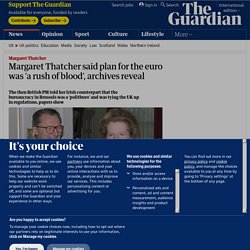
In an echo of the divisive political debate that ultimately led to Brexit, the then British prime minister hit out at the “politburo” in Brussels and vowed not to be dictated to, during talks with her then Irish counterpart. The Tory leader likened giving away powers of taxation to gifting sovereignty to Europe, the archives from 1990 show. The Irish government note recorded that Thatcher said: “In talking of a single currency, [Jacques] Delors must have had a rush of blood to the head.
“We are not going to have a single currency.” Bust-ups and brinkmanship: inside story of how the Brexit deal was done. Even in its final hours, the settling of Britain’s future trading and security relationship with the European Union was a painful affair, dragging deep into the night and on into Christmas Eve morning and afternoon, with Downing Street insisting right to the end that nothing was certain.

The deal was finally struck at 1.44pm UK time. It could not have come soon enough for two exhausted teams that had been squabbling over, crafting, drafting and redrafting legal text in a final two-week run-in under the headache-inducing strip lights of the Albert Borschette conference centre, a drab building in the EU quarter of Brussels. It was like “negotiating in a 1970s car park”, a British official said. German government officials in their nearby embassy had enjoyed a running gag as they counted off the Brexit deadlines that had slipped past over the last year. But the joke had worn thin for British officials at the coalface. As Christmas Day drew closer, morale was sapping, frustration showing. Instead of uniting us, Boris Johnson is presiding over the breakup of Britain. Rarely do I find myself talking about cricket, but somehow I recently got into a long conversation about it with a young Pakistani student.
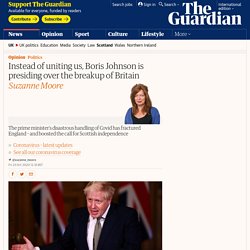
I had attended the trial in 1996 in which Ian Botham had accused Imran Khan of libel. Khan had called Botham and fellow cricketer Allan Lamb “uneducated racists”. We noted that Botham is now a lord and Khan prime minister of Pakistan. But the bigger conclusion we came to was that no one is actually in charge in this country any more.
Not Boris Johnson, not Dominic Cummings, not the EU. It’s not an unusual conversation for me, a chat about political drift with a stranger. The cricket fan I was talking to reckoned the only person who could pull everything together is an unmasked 94-year-old: the Queen. As each part of the UK goes into its own particular regional lockdown, there is no unity whatsoever. Actually, can we just stop talking about this vast area that contains swing seats in such a way? August-2019-MINISTERIAL-CODE-FINAL-FORMATTED-2. Any Johnson Brexit deal sows seeds of future confrontation with the EU. Boris Johnson wanted to be prime minister long before he wanted to take Britain out of the EU.
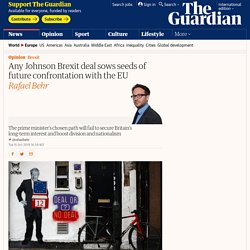
The novelty of Brexit among his ambitions prompts a thought experiment: imagine there was no referendum. By some other craft Johnson has reached Downing Street. Barnier sets Johnson a midnight deadline for Brexit concessions. Michel Barnier has set Boris Johnson a midnight deadline to concede to EU demands and agree to a customs border in the Irish Sea or be left with nothing to take to the Commons.
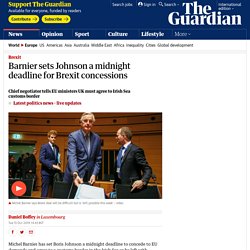
According to sources, the EU’s chief negotiator told ministers that without a major move there was little prospect of a deal being signed off by leaders at a summit on Thursday, before a special sitting of the UK parliament on Saturday. Legal text had yet to be tabled by the British negotiators, Barnier told ministers in Luxembourg. He advised the EU capitals he would announce on Wednesday whether negotiations on an agreement would have to continue into next week. Revealed: the EU's point-by-point rejection of Johnson's Brexit plan. The Guardian view on a changing EU: leaving Britain behind. There is a common misperception among British Eurosceptics that the EU is as obsessed with obstructing Brexit as they are with completing it.
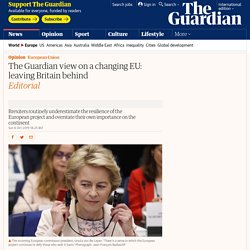
That is untrue in two ways. First, the priority in Brussels is to facilitate the UK’s orderly departure. There was a phase of grief, but that has mostly given way to frustration at British politicians’ collective ineptitude – remainers as well as leavers. Second, EU eyes are mostly elsewhere. The Guardian view on the backstop proposals: Britain’s broken promise. Boris Johnson has reached for the word compromise many times in the last two days as he has promoted his new Brexit proposals.
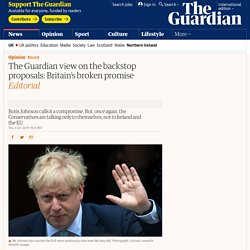
There were three mentions of compromise in his party conference speech in Manchester on Wednesday, a further four in his letter to the European commission, two in the statement he delivered to MPs at Westminster on Thursday and several others in the exchanges that followed. These usages, although tendentious, are not wholly specious. The Tories have lost their ideology. Now they are merely the party of resentment. What does the Conservative party stand for in 2019? If you survey the central tenets of Tory ideology from the past 50 years, it is hard to find a single one that is still intact. The party of business is hellbent on undermining access to an export market of half a billion people.
The party of law and order is now raging against the judiciary – with senior Tories being regularly asked whether their government intends to obey the law. The party of “family values” – “back to basics”, as John Major put it – has now fallen for the charms of a famous philanderer, who is currently being dogged by questions about how his “close friend”, Jennifer Arcuri, was awarded £126,000 of grants during his time as London mayor. Europe isn’t the enemy – demonising us is undermining Britain. Seventeen years ago Theresa May stunned her fellow Conservatives by telling their annual party conference that they were “just plain unattractive”. The Tories, she said, had become “the nasty party”.
Today, from where I sit in western Europe, Britain itself looks just plain unattractive. It seems to have become “the nasty country”. I’m not saying the British people are any worse, or any better, than any other Europeans. I am saying its ruling political party is nasty, as is much of its press. Boris Johnson's suspension of parliament unlawful, supreme court rules. Bettel's anger highlights a bleak truth: the EU27 just wants Britain to go. It was, by any standards, an unusual spectacle: the leader of the European Union’s second-smallest country deciding to empty-chair the British prime minister at what was supposed to have been a joint press conference after their meeting. Ostensibly, logistics were the problem: No 10 was concerned by the small but very noisy protest awaiting Boris Johnson outside; Luxembourg government officials said there was no room big enough to move the event inside.
Whatever the reason, the press conference that Xavier Bettel ended up giving alone – gesturing to the lectern where his counterpart should have stood – served as a striking symbol of EU leaders’ mounting frustration with the Brexit process. The Luxembourg prime minister did not hold back. The leave campaign had been built on lies, he said. Hopes of clean break with EU are nonsense, says ex-Brexit official. Three years on, we’ve still not answered the question: what has the EU done for us? Britain is run by a self-serving clique. That’s why it’s in crisis. Last week Boris Johnson delivered a speech to a Royal Horticultural Society audience in Wisley, Surrey, before heading to the affluent village of Oxshott to buy some fennel and tarragon sausages and have a cup of tea in the Munch and Wiggles cafe. Was die Briten sicher nicht hören wollen. 'Ma’amageddon': secret plans for Queen's nuclear address revealed.
In the apocalyptic event of a nuclear strike on Britain, the government offered householders make-do-and-mend advice on how to create refuge shelters under stairs and tables, and knock up temporary toilets from a chair and bucket. Few were reassured by the DIY defences advocated in the widely lampooned public information “Protect and Survive” pamphlet, published in 1980, and a new cold war exhibition at the National Archives in Kew, featuring such a shelter, will do little to augment faith in this as a robust strategy for civilian survival.
Complete with identification tags for the dead, shelves of tinned food, and “sandbagged” with suitcases, furniture and soft furnishings, it seems unlikely it could much prolong life. “We want people to think, ‘how would I have coped if the worst had happened?’